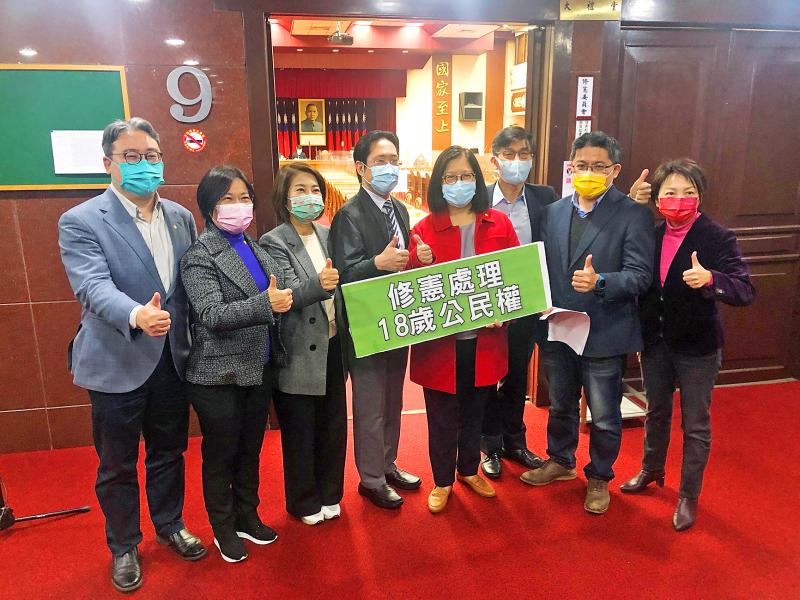A constitutional amendment that would see the voting age lowered to 18 from 20 passed a committee review at the legislature in Taipei yesterday.
The Constitutional Amendment Committee approved the amendment, which was cosponsored by the ruling Democratic Progressive Party (DPP), the Taiwan People’s Party (TPP) and the New Power Party (NPP), and which seeks to bring the voting age in line with most other democratic nations.
Barring objections or proposed revisions requiring inter-party negotiations, the bill will undergo a second reading later this week.

Photo: CNA
Fourteen Chinese Nationalist Party (KMT) legislators did not attend the meeting as part of an ongoing protest against the DPP for setting the agenda for the 39-member committee in a meeting on Jan. 6 without them being present.
The proposed amendment would grant Taiwanese who are 18 or older the right to vote. It would also pave the way for further legislation to lower the minimum age for running as a candidate in an election from 23 years old.
At a news conference prior to the committee meeting, TPP Legislator Jang Chyi-lu (張其祿) said the three parties had reached a consensus over the issue, despite having minor differences, such as where the amendment should be placed in the Constitution.
Jang said he was looking forward to lawmakers setting aside their differences and making progress with the legislation as soon as possible.
NPP Legislator Chiu Hsien-chih (邱顯智) said the constitutional revision is long overdue, as Taiwan had fallen behind many nations that have lowered the voting age to 18.
Chiu said he hopes the amendment would clear the legislature as soon as possible so it could be put to a vote in a referendum.
The additional articles of the Constitution state that amendments must first clear the legislature with the approval of at least three-quarters of lawmakers present at a meeting attended by at least three-quarters of all the lawmakers.
Based on the current distribution of seats in the legislature, where the DPP holds 61 seats and the KMT holds 39, it would take cooperation between the two main parties for any constitutional amendment to be passed.
If an amendment is approved by lawmakers, it must then be voted on in a national referendum and can only pass if half of all eligible voters cast ballots in favor of its passage.
KMT Legislator Chen Yu-jen (陳玉珍) said that the party supported the initiative to lower the voting age, but it strongly opposed the DPP deciding on the committee agenda without negotiating with the KMT, a move she described as lacking procedural justice.
However, even if KMT lawmakers had been present at the meeting on Jan. 6, it was likely that the committee, in which the DPP holds a majority of 21 seats, would have agreed to the DPP’s favored agenda.
DPP Legislator Chou Chun-mi (周春米) urged the KMT to stop boycotting meetings of the committee and take part in the legislative process.

SECURITY: As China is ‘reshaping’ Hong Kong’s population, Taiwan must raise the eligibility threshold for applications from Hong Kongers, Chiu Chui-cheng said When Hong Kong and Macau citizens apply for residency in Taiwan, it would be under a new category that includes a “national security observation period,” Mainland Affairs Council (MAC) Minister Chiu Chui-cheng (邱垂正) said yesterday. President William Lai (賴清德) on March 13 announced 17 strategies to counter China’s aggression toward Taiwan, including incorporating national security considerations into the review process for residency applications from Hong Kong and Macau citizens. The situation in Hong Kong is constantly changing, Chiu said to media yesterday on the sidelines of the Taipei Technology Run hosted by the Taipei Neihu Technology Park Development Association. With

A US Marine Corps regiment equipped with Naval Strike Missiles (NSM) is set to participate in the upcoming Balikatan 25 exercise in the Luzon Strait, marking the system’s first-ever deployment in the Philippines. US and Philippine officials have separately confirmed that the Navy Marine Expeditionary Ship Interdiction System (NMESIS) — the mobile launch platform for the Naval Strike Missile — would take part in the joint exercise. The missiles are being deployed to “a strategic first island chain chokepoint” in the waters between Taiwan proper and the Philippines, US-based Naval News reported. “The Luzon Strait and Bashi Channel represent a critical access

‘FORM OF PROTEST’: The German Institute Taipei said it was ‘shocked’ to see Nazi symbolism used in connection with political aims as it condemned the incident Sung Chien-liang (宋建樑), who led efforts to recall Democratic Progressive Party (DPP) Legislator Lee Kun-cheng (李坤城), was released on bail of NT$80,000 yesterday amid an outcry over a Nazi armband he wore to questioning the night before. Sung arrived at the New Taipei City District Prosecutors’ Office for questioning in a recall petition forgery case on Tuesday night wearing a red armband bearing a swastika, carrying a copy of Adolf Hitler’s Mein Kampf and giving a Nazi salute. Sung left the building at 1:15am without the armband and apparently covering the book with a coat. This is a serious international scandal and Chinese

COUNTERINTELLIGENCE TRAINING: The ministry said 87.5 percent of the apprehended Chinese agents were reported by service members they tried to lure into becoming spies Taiwanese organized crime, illegal money lenders, temples and civic groups are complicit in Beijing’s infiltration of the armed forces, the Ministry of National Defense (MND) said in a report yesterday. Retired service members who had been turned to Beijing’s cause mainly relied on those channels to infiltrate the Taiwanese military, according to the report to be submitted to lawmakers ahead of tomorrow’s hearing on Chinese espionage in the military. Chinese intelligence typically used blackmail, Internet-based communications, bribery or debts to loan sharks to leverage active service personnel to do its bidding, it said. China’s main goals are to collect intelligence, and develop a